News coverage of Proposition 187 woke up the ‘sleeping giant’; several articles were translated into English at the request of some universities
Jesús Hernández Cuéllar, editor of the Metropolitan section of the La Opinion newspaper during the emergence of Proposition 187, said the goal was to expose the contribution of immigrants in California and the United States, and deny the proponents of the measure, including to former Republican Governor Pete Wilson.
“I think California Proposition 187 was the first moment of great attack against the immigrant community in many years; nobody thought about that hostility and great tension at that time, "said Hernandez." It was a historic moment because California had just approved a proposition that finally died in court as unconstitutional. "
Outside of politics, there were no people insulting Latinos on the streets for not speaking English or being told to "go to your country," as is now the case in the federal administration headed by Donald Trump.
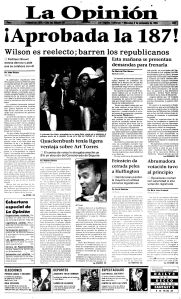
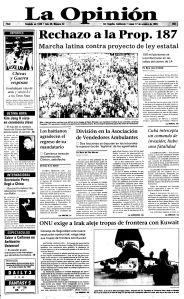
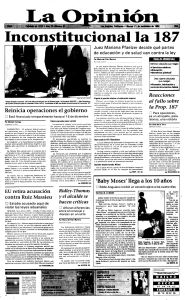
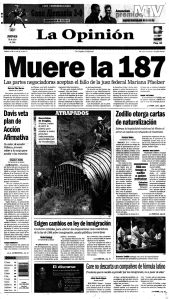
Hernandez said that, frankly, he does not remember an environment as hostile against immigrants as it is today, because he even seems to have some kind of rejection of the same proposal in California.
In the pages of La Opinión, Hernández also gave voice to the supporters of the proposal. In each publication there was always journalistic balance.
To achieve the objectives, Hernández relied on a payroll of experienced reporters under the command of José Ubaldo and the state editor of that time, Jaime Olivares.
Among the reporters were: María Luisa Arredondo, responsible for the immigration information source, but always backed by José Luis Sierra, Francisco Robles, Pablo Comesaña, María Ballesteros, Leticia García Irigoyen, Armando E. Botello, Roger Lindo, Lilian De la Torre-Jiménez and Pilar Marrero. They were advised by the Editorial Board of that time: Henrik Rehbinder, editorialist; Juan José García, editor; Gerardo López, editorial director and Mónica Lozano, executive director of the newspaper.
“When the polls that favored Democrat Kathleen Brown, Pete Wilson's opponent, appeared, the attacks on the community intensified,” recalled Gerardo López. "They blamed immigrants for all the economic evils the state was going through."
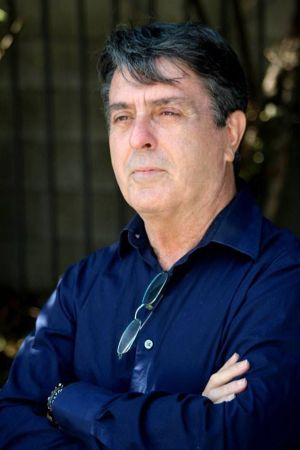
He said that it would only be enough to remember the image of a traffic signal where two parents and their daughter are seen running hand in hand and crossing on a highway, or the announcement on TV that said: “They keep coming”.
To counteract the diatribe of the proponents of the law, Hernández conceived a special series of 10 parts on the contribution of Latino immigrants in issues such as economics, education, agriculture, jobs, consumption, business, art, sports, and others. It was an ambitious project that Mónica Lozano immediately supported.
Deny those who cheat
“The series refuted the idea that Latinos and immigrants had not been living off welfare; We talked about the Bracero Program and other ideas that made the reader see the tremendous importance that immigrants have in California, ”said Hernández.
The basis of the importance of journalistic coverage of La Opinión was echoed because it emphasized the contributions of immigrants to the economy of California and the country.
The universities began calling and asking for the translation of the series into English. The first part was opened with a summary of the published articles. Much of the work was done between Hernández and María Luisa Arredondo.
On October 16, 1994, at least 100,000 people marched in Los Angeles to the mayor's office to demonstrate against Proposition 187, which was approved a month later at the polls. It was the biggest march that had been seen since the protests against the Vietnam War and civil rights.
Arredondo says it was impressive to see thousands of Latino people without documents go out for the first time to express themselves.
“The message was that they were not going to cross their arms in the face of an artful attack. ‘Here we are and we are not leaving, because we are not criminals. We are contributing and we are good people. People from Mexico, Central Americans and South Americans joined the march, ”he recalls.

Because of the obvious unconstitutionality of the proposal, Arredondo never thought it would be approved by the electorate, but "was wrong," he says. "Even Latinos I knew turned their backs on their own community … they didn't care."
The journalist emphasizes that the role of the media was incredible, as was the union of many organizations in defense of the undocumented.
Gerardo López added that the anti-immigrant rhetoric that was lived in newspapers and on television (mainly in English), did not match the real lives of family members and young people who had taken to the streets to express their disagreement.
"(The march) was a natural reaction to a discriminatory attitude of many people," Lopez said, as California was emerging to pass a law that due to cruelty and unconstitutionality, years later would die in court.
The journalistic series of La Opinión was one of the most important works of the editorial team in the 90s of the last century.
Attacks against undocumented immigrants
Among other restrictions, Law 187 established that a person would not receive any public social service, medical care until he was verified as a citizen of the United States or as a legally admitted foreigner.
Also, primary or secondary would not admit any child until it complied with the verification of citizenship or legally admitted foreigner.
By 1996, each school district would be required to verify the legal status of each child enrolled within the district and the legal status of each parent or guardian of each child. A child who violates these requirements would not continue to attend school 90 days after the date of notification to the attorney general and the now extinct National Immigration Institute (INS), now ICE.
According to Juan José “Juanjo” García, former editor of La Opinión, the campaign in favor of the proposal was very intense and it is estimated that about 3 billion dollars were spent to get its approval.
Juanjo recalled that, among the main proponents of the 187, in addition to Wilson, was State Attorney General Dan Lungren, Long Beach Republican, and Assemblyman Dick Mountjoy, Monrovia Republican and author of the original proposal.
"Even Democratic Senator Dianne Feinstein wanted to be tougher than the tough ones against the undocumented to ensure her re-election to the federal Senate," Garcia said. "As you can see, it was a radical and cruel proposal, in addition to covering authoritarian dyes that could turn California into a state of" snitches. "
Proposition 187 was officially approved with 5,063,537 votes or 58.93% of the electorate. The total votes against were 3,529,432, that is, 41.07%.
And, according to an exit poll from the Los Angeles Times, on the day of the general election (November 8, 1994) non-Hispanic white voters supported 187 with 63% and Latinos 23%.
Consciousness Mobilization
After the approval of the law, La Opinión increased its coverage in the movements of established organizations such as CHIRLA and CARECEN and One Stop Immigration, churches of different denominations and legal organizations such as ACLU and MALDEF.
The spontaneous mobilization of the students, who took the streets on more than one occasion to express their disagreement with the approved law, was also reported.
´´In La Opinión we intensified our civic journalism projects that led us to talk with readers, gather their concerns and aspirations to transform them into special supplements and more relevant daily news coverage. Many of the young Latinos who took to the streets to protest against 187, are now politicians, activists and professionals in different specialties, '' López said.
The coverage also included the voice and opinions of experts both at the political, legal and community level that finally helped raise awareness of how harmful the measure was, not only for the community, but for the state as a whole.
Those pages of the editorial section were in charge of the great journalist and head of the editorial page, Rafael Buitrago.
From the anti-immigrant electoral rhetoric, its racist and discriminatory tone sprouted renewal movements: political activism, increase in the number of residents who became citizens and greater electoral participation.
And, in the midst of this warm atmosphere and the lack of jobs, many Latinos faced the dilemma of leaving the state or looking for a way to make a living. Many of those who decided to stay, established countless small businesses.
In La Opinion, the Business section was created to offer useful and practical information, as well as to count the startups and successes of these entrepreneurs.
In addition to 187, the newspaper also reported the effects of the implementation of the "Operation Guardian" that marked the beginning of the construction of a metal wall under the administration of Bill Clinton, whose main objective was to stop the migration that came from the south from the border.
“In 1994 there was no public manifest support in the streets; something very different from what we now see, ”said Jesús Hernández. “What serves as a reference to understand that the same thing is happening in the present is that the executive orders (of Donald Trump) are being rejected in the courts over and over again, and that really reminds us of hatred, racism and xenophobia".
Agustín Durán contributed to this note






